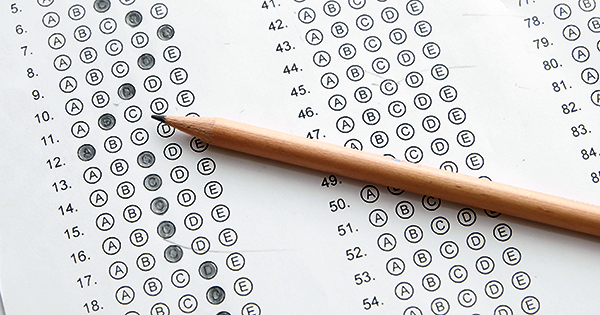Standardized Tests’ Inaccuracies and Biases Harm Test-Takers

Standardized test form with answers bubbled in and a pencil, focus on anser sheet
January 5, 2022
The use of standardized testing is a problematic part of the United States’ education system. It has inherent biases against certain students, and leads to the accumulation of even more stress for students. Not only that, but the results of the tests are inaccurate, with most scores only increasing temporarily year-by-year.
Standardized tests have been a part of American culture for over 150 years. Mandated testing began before the Civil War, as a way to assess student progress across various subjects. However, it was not heavily criticized until the No Child Left Behind educational reform, which was passed in 2001. This gave the federal government more control over public schools and led to much more widespread testing.
Today, due to the Every Student Succeeds Act of 2015, standardized testing has been reduced once again. But these tests still exist today, and are often harmful to the students taking them. The rollback of these tests should continue into the future in order to advance the education of America’s youth.
The most prevalent problem of these tests is their inherent bias towards minority groups since their inception. These minority groups have historically scored lower on standardized tests than white people, and it is not due to any difference in intelligence. When the tests we see today were invented, they were used as tools for eugenicists such as Carl Brigham to keep people of color out of historically white Anglo-Saxon schools. In Brigham’s book A Study of American Intelligence, he claimed that his tests highlighted the “superiority of the Nordic group” in comparison to people of other ethnicities.
Brigham also worked in order to establish many other standardized tests that still exist today, including AP examinations, the SAT, the ACT, and the Stanford-Binet test. In today’s society, some of these examinations are still highly important for college admissions despite the fact that they were formed with openly racist intentions with biases against marginalized racial groups.
Standardized tests used in college admissions, such as the ACT and SAT, also are inherently classist. Children whose parents have a higher socioeconomic status are more likely to pay for tutors in order to improve their scores. Several paid programs promise to improve SAT scores by over 200 points or guarantee a score of 1500+, an option that is not available for low-income families.
Rather than focusing on learning the material and formulas used on the test, most tutors focus on how to manipulate the test in your favor. Strategies such as simply choosing the most concise answer or doing particular types of questions before others are repeatedly hammered into the students’ head by their tutor. These resources are locked behind paywalls frequently in order to force students to buy the programs and tutors.
Senior Ravi Prevost feels disadvantaged due to not having a tutor. He was not able to learn the patterns and test-taking tips offered through tutors. He feels that “it really penalizes people who aren’t good at pure memorization.”
As I and many others can attest to, tests like these that can quite literally change our lives tend to be extremely stressful. Hours upon hours of preparation go into each test as we have to compete with one another for higher scores. And the culmination of all of this work, all of the effort that is put in, is a singular value. This number determines how you compare to those around you. And for students, it can determine where you go to college, how much funding your school gets, etc.
Farhad Ghorban DordiNejad, a teacher at Shahid Rajaee University, conducted a study of 150 students in 2011 that showed that test anxiety was associated with lower test scores. Personally, I can attest to this feeling of anxiety before tests as performance and higher scores are so important in getting into college. “I am more stressed about standardized tests than normal tests,” said senior Nicole Wasserman. She said that she feels as if this stress negatively harms her academic performances as well.
Harvard Graduate School of Education found that cortisol levels, or the chemical that causes stress, increase 15% before standardized tests than on normal days. This same study also found that students who live in areas with higher levels of poverty and crime produced more cortisol than others, which led to lower test results. So many factors that affect the scores of standardized testing are out of the hands of those taking them, which symbolizes the unfair system that is in place today.
‘It creates unnecessary stress for students,” Ms. Ayoob said. She also believes that it doesn’t “think it translates into a student’s ability. Some people are really good at multiple choice and some people are good at essays.” She cited another issue with standardized testing, talking about her schooling in Oakland where her school would receive seventh-hand textbooks to study from.
However, some educators claim that standardized tests are beneficial to their student body. The main argument for these types of tests is that they provide an objective measure of the education standards across the nation. There is no other way currently to get the same amount of information from other methods.
The issue with this argument is that the information obtained through these tests is inherently biased and inaccurate. As previously stated, minority groups and lower-income students are less likely to perform well on the tests despite other academic success.
On top of this, the results of these tests are in and of themselves flawed. They do not measure student’s knowledge on specific subjects or intelligence. In fact, a Brookings Institute study showed that 50-80% of test score fluctuations were only temporary improvements over the year before, caused by external factors instead of knowledge.
“I think that standardized tests specifically are bad because they don’t fit different learning styles,” Wasserman said. She mentioned neurodivergent people and people with reading disabilities as specific groups that are harmed by this testing. They cannot accurately test many groups of people, which harms groups of people that don’t fit into their mold.
Statistics teacher Mr. Ortiz believes that standardized testing has its upside in indicating a small amount of knowledge, but he urges the test designers to ask, “is the information biased? Are the questions biased?” Too often, the answer to these questions is yes. He also believes that “some people can excel at standardized tests but may not be good at a university.” The tests may offer a small glance into a student’s mind, but they cannot test the full extent of the student’s knowledge.
Supposedly, the SAT and ACT tests can determine success in colleges, which is why they are still used today. The SAT website claims that their scores are “strongly predictive of college performance.”
This is not the case at all. The strongest indicator of success in college is still GPA, not any standardized test. The American Educational Research Association conducted a study of over 50,000 college students that ultimately showed that GPA is five times more likely to predict college success and graduation rates than the ACT or SAT.
Standardized tests are an obsolete practice that has somehow been a part of the United State’s inadequate education system for decades. They enforce racist and classist systems, and the scores they produce are extremely inaccurate. The stress that these tests cause are the opposite of healthy, as hours upon hours are poured into practice tests and studying on top of school work. I can only hope that the next step forward in education involves the end of these tests once and for all.





































